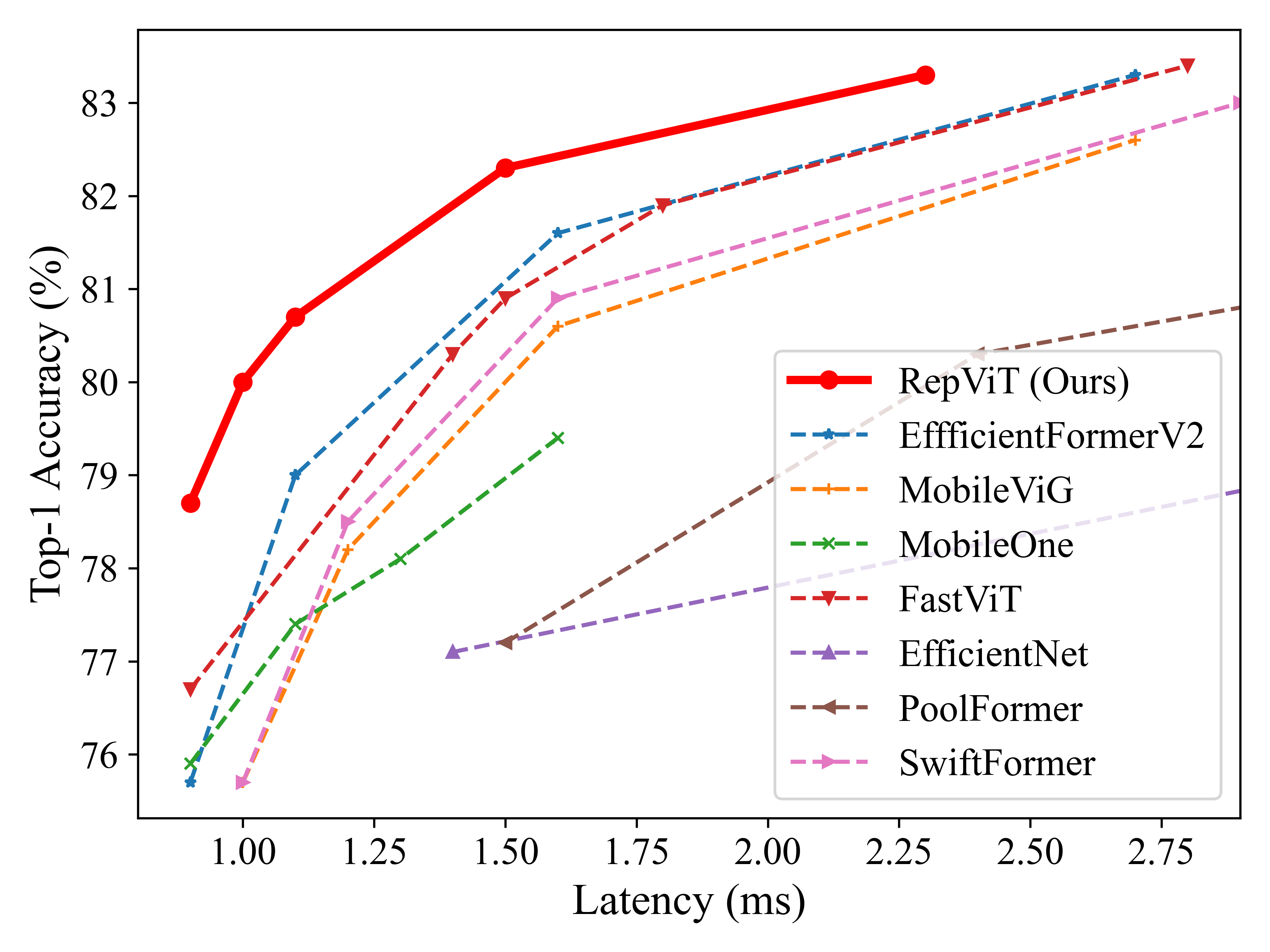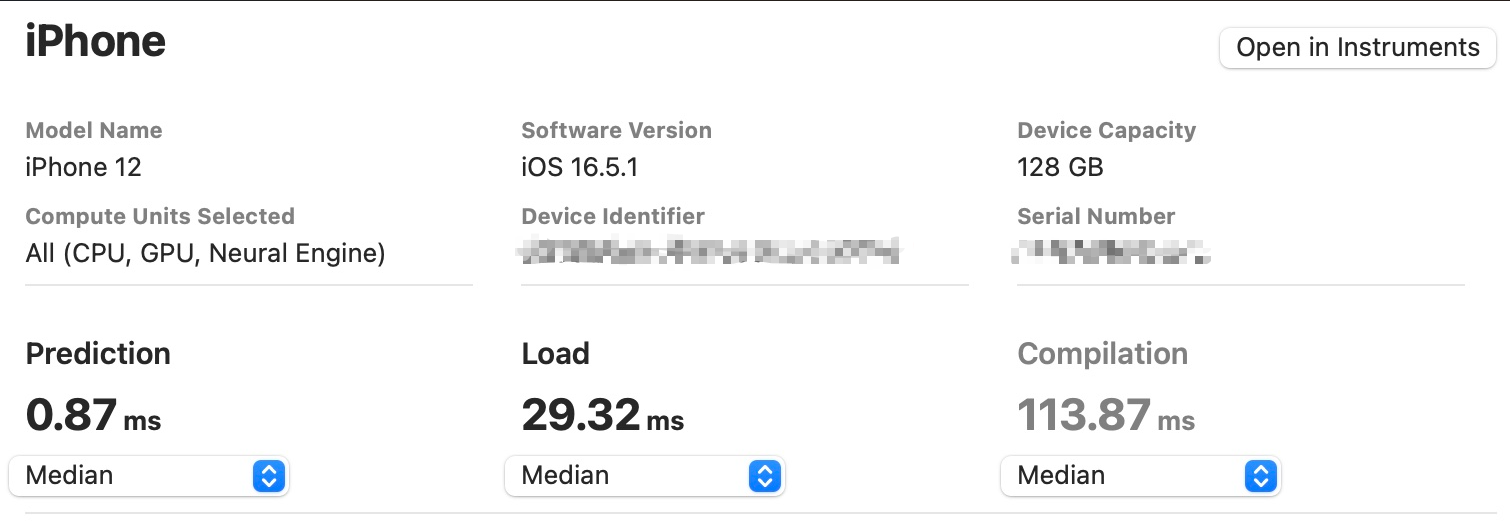Official PyTorch implementation of RepViT-SAM and RepViT. CVPR 2024.

Models are deployed on iPhone 12 with Core ML Tools to get latency.

Models are trained on ImageNet-1K and deployed on iPhone 12 with Core ML Tools to get latency.
RepViT-SAM: Towards Real-Time Segmenting Anything.
Ao Wang, Hui Chen, Zijia Lin, Jungong Han, and Guiguang Ding
[arXiv] [Project Page]
Abstract
Segment Anything Model (SAM) has shown impressive zero-shot transfer performance for various computer vision tasks recently. However, its heavy computation costs remain daunting for practical applications. MobileSAM proposes to replace the heavyweight image encoder in SAM with TinyViT by employing distillation, which results in a significant reduction in computational requirements. However, its deployment on resource-constrained mobile devices still encounters challenges due to the substantial memory and computational overhead caused by self-attention mechanisms. Recently, RepViT achieves the state-of-the-art performance and latency trade-off on mobile devices by incorporating efficient architectural designs of ViTs into CNNs. Here, to achieve real-time segmenting anything on mobile devices, following, we replace the heavyweight image encoder in SAM with RepViT model, ending up with the RepViT-SAM model. Extensive experiments show that RepViT-SAM can enjoy significantly better zero-shot transfer capability than MobileSAM, along with nearlyRepViT: Revisiting Mobile CNN From ViT Perspective.
Ao Wang, Hui Chen, Zijia Lin, Jungong Han, and Guiguang Ding
[arXiv]
Abstract
Recently, lightweight Vision Transformers (ViTs) demonstrate superior performance and lower latency compared with lightweight Convolutional Neural Networks (CNNs) on resource-constrained mobile devices. This improvement is usually attributed to the multi-head self-attention module, which enables the model to learn global representations. However, the architectural disparities between lightweight ViTs and lightweight CNNs have not been adequately examined. In this study, we revisit the efficient design of lightweight CNNs and emphasize their potential for mobile devices. We incrementally enhance the mobile-friendliness of a standard lightweight CNN, specifically MobileNetV3, by integrating the efficient architectural choices of lightweight ViTs. This ends up with a new family of pure lightweight CNNs, namely RepViT. Extensive experiments show that RepViT outperforms existing state-of-the-art lightweight ViTs and exhibits favorable latency in various vision tasks. On ImageNet, RepViT achieves over 80\% top-1 accuracy with 1ms latency on an iPhone 12, which is the first time for a lightweight model, to the best of our knowledge. Our largest model, RepViT-M2.3, obtains 83.7\% accuracy with only 2.3ms latency.UPDATES 🔥
- 2023/12/17: Grounding-SAM supports RepViT-SAM with Grounded-RepViT-SAM. Thanks!
- 2023/12/11: RepViT-SAM has been released. Please refer to RepViT-SAM.
- 2023/12/11: RepViT-M0.6 has been released, achieving 74.1% with ~0.6ms latency. Its checkpoint is here
- 2023/09/28: RepViT-M0.9/1.0/1.1/1.5/2.3 models have been released.
- 2023/07/27: RepViT models have been integrated into timm. See huggingface/pytorch-image-models#1876.
| Model | Top-1 (300 / 450) | #params | MACs | Latency | Ckpt | Core ML | Log |
|---|---|---|---|---|---|---|---|
| M0.9 | 78.7 / 79.1 | 5.1M | 0.8G | 0.9ms | 300e / 450e | 300e / 450e | 300e / 450e |
| M1.0 | 80.0 / 80.3 | 6.8M | 1.1G | 1.0ms | 300e / 450e | 300e / 450e | 300e / 450e |
| M1.1 | 80.7 / 81.2 | 8.2M | 1.3G | 1.1ms | 300e / 450e | 300e / 450e | 300e / 450e |
| M1.5 | 82.3 / 82.5 | 14.0M | 2.3G | 1.5ms | 300e / 450e | 300e / 450e | 300e / 450e |
| M2.3 | 83.3 / 83.7 | 22.9M | 4.5G | 2.3ms | 300e / 450e | 300e / 450e | 300e / 450e |
Tips: Convert a training-time RepViT into the inference-time structure
from timm.models import create_model
import utils
model = create_model('repvit_m0_9')
utils.replace_batchnorm(model)
The latency reported in RepViT for iPhone 12 (iOS 16) uses the benchmark tool from XCode 14. For example, here is a latency measurement of RepViT-M0.9:
Tips: export the model to Core ML model
python export_coreml.py --model repvit_m0_9 --ckpt pretrain/repvit_m0_9_distill_300e.pth
Tips: measure the throughput on GPU
python speed_gpu.py --model repvit_m0_9
conda virtual environment is recommended.
conda create -n repvit python=3.8
pip install -r requirements.txt
Download and extract ImageNet train and val images from http://image-net.org/. The training and validation data are expected to be in the train folder and val folder respectively:
|-- /path/to/imagenet/
|-- train
|-- val
To train RepViT-M0.9 on an 8-GPU machine:
python -m torch.distributed.launch --nproc_per_node=8 --master_port 12346 --use_env main.py --model repvit_m0_9 --data-path ~/imagenet --dist-eval
Tips: specify your data path and model name!
For example, to test RepViT-M0.9:
python main.py --eval --model repvit_m0_9 --resume pretrain/repvit_m0_9_distill_300e.pth --data-path ~/imagenet
Object Detection and Instance Segmentation
Semantic Segmentation
Classification (ImageNet) code base is partly built with LeViT, PoolFormer and EfficientFormer.
The detection and segmentation pipeline is from MMCV (MMDetection and MMSegmentation).
Thanks for the great implementations!
If our code or models help your work, please cite our paper:
@misc{wang2023repvit,
title={RepViT: Revisiting Mobile CNN From ViT Perspective},
author={Ao Wang and Hui Chen and Zijia Lin and Jungong Han and Guiguang Ding},
year={2023},
eprint={2307.09283},
archivePrefix={arXiv},
primaryClass={cs.CV}
}
@misc{wang2023repvitsam,
title={RepViT-SAM: Towards Real-Time Segmenting Anything},
author={Ao Wang and Hui Chen and Zijia Lin and Jungong Han and Guiguang Ding},
year={2023},
eprint={2312.05760},
archivePrefix={arXiv},
primaryClass={cs.CV}
}# 环境配置
git clone https://github.com/kaixin-bai/RepViT.git
conda create -n repvit python=3.8
conda activate repvit
conda install pytorch==1.12.1 torchvision==0.13.1 cudatoolkit=11.3 -c pytorch
pip3 install timm==0.5.4 fvcore opencv-python
cd RepViT/
cd sam/
pip install -e .
# 下载权重
mkdir weights && cd weights
wget https://github.com/THU-MIG/RepViT/releases/download/v1.0/repvit_sam.pt
# 测试网页
cd ..
pip3 install gradio
python3 app/app.py
# 测试推理
cd scripts
python3 amg.py-
参考
predictor.py文件中SamPredictor的set_torch_image,此文件中多尺度特征图可输出 -
参考
repvit.py文件中RepViT的推理,这里可以将多尺度特征图进行输出。注意最后1/16的图有两个,一个是进入neck之前的,一个是之后的
